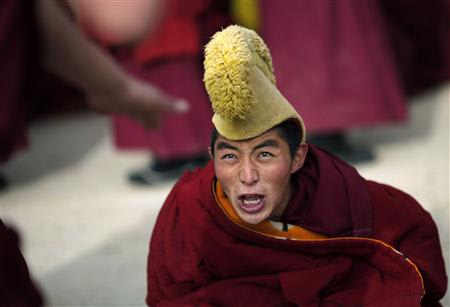
Some experts have said Communist Party chief Xi Jinping -- whose former vice premier father had a close bond with exiled Tibetan spiritual leader the Dalai Lama -- might adopt a more reformist approach to the troubled mountainous region when he takes over as president in March.
But so far, the anti-China protests, including 81
burning cases this year, have only been met with an intensified
crackdown by Chinese security forces.Beijing has defended its iron-fisted rule in Tibet, saying the remote region suffered from dire poverty, brutal exploitation of serfs and economic stagnation until 1950 when Communist troops "peacefully liberated" it.
The country's top court and public security authorities have now issued a directive that allows for criminal charges, including intentional homicide, to be filed against self-immolators and anyone who "organizes, plots, incites, coerces, entices, abets, or assists others" in such protest.
An official southwestern Gansu province newspaper explained the order on its website last week, saying authorities should prevent people from gathering to mourn a self-immolator or collect money for family members.
State media reported on Sunday that police in Sichuan province detained a Tibetan monk and his nephew for "inciting" eight people to set themselves on fire since 2009.
There has been a steep increase in cases of self immolation this year, and in November alone -- when Xi was named the new head of the Party -- 29 people set themselves on fire.
In all, there have been 94 burnings to protest Chinese
rule since 2009, according to the Tibet-government-in-exile. At least 77
people have died from their injuries.Few people know what Xi thinks of Tibet or the Dalai Lama, but his liberal-minded father's thinking is certain to be influential.
The Dalai Lama has never met Xi but his fondness for his father is, for some, a sign that China's
next leader may take a different line on Tibet. Some expect him to be
more tolerant of Muslim Uighurs in the western region of Xinjiang, and
also of Taiwan, the independently ruled island that China has vowed to
take back, by force if necessary.
INTERNATIONAL RESPONSEWhile the steep rise in cases of people setting themselves on fire appears to be strengthening solidarity among Tibetans, the grisly protests have drawn only a muted response from the international community and -- until very recently -- dwindling media coverage.
"The international community should be doing a lot more," Tibet's Prime Minister in-exile Lobsang Sangay told Reuters in Dharamsala, India, adding that the Tibetans are "definitely" dying in vain.
Last week, Washington did step up the pressure when Maria Otero, U.S. Special Coordinator for Tibetan Issues, said tensions in Tibetan areas, including self-immolations, had been exacerbated by tough Chinese policies and controls.
China's Foreign Ministry lashed back, calling the comments "disgusting" and saying it had prompted a formal diplomatic complaint with Washington.
The United States and several other countries have made calls for China to negotiate with the Dalai Lama and end repressive policies.
But Nicholas Bequelin, a researcher at Human Rights Watch, said the international community has failed in its response by not uniting to put multilateral pressure on Beijing.
"Nobody is going to cut trade relations with China. But decades of inactivity have been detrimental," he said.
INCREASED SOLIDARITY
Advocacy groups say the new wave of self-immolations mark an intensifying phase of the Tibet protests, with people increasingly setting themselves on fire in small groups or within short spans of time.
All but one of the protests since 2009 have come after the March 2011 self-immolation of a 20-year-old monk, Phuntsog, at the Kirti monastery in a Tibetan part of Sichuan province.
Months of sporadic self-immolations by sympathetic monks and nuns followed, all in the name of opposing Chinese rule and calling for the return of the Dalai Lama, who fled to India after a failed 1959 uprising.
As sentiment spread, lay people in scattered villages in eastern parts of the Tibetan plateau in Sichuan, Qinghai and Gansu provinces began to self-immolate as well.
Internationally, a single self-immolation appears to have lost the impact it once had.
"Appalling as it is to recognize, it now seems that these kinds of deaths become a politically effective tool only when they are done in clusters," said Robbie Barnett, a Tibetologist at Columbia University in New York.
Self-immolations have historically only been effective in achieving political concessions when carried out under weak governments, but they have increased solidarity within parts of the Tibetan community, Barnett said.
"It hasn't been effective in getting any change in policy, but it has been effective in mobilizing sentiment within the Tibetan community inside Tibet," he said.
The long lines of people going to pay respects and donate money to the families of people who have immolated are evidence of this, Barnett said. China's new regulations aim to suppress this practice.
But Barnett said Tibetans, including the exiled government in India, are playing the "politics of sympathy", a tactic that makes powerful symbolic statements, but does little to articulate coherent and urgent policy demands.

No comments:
Post a Comment